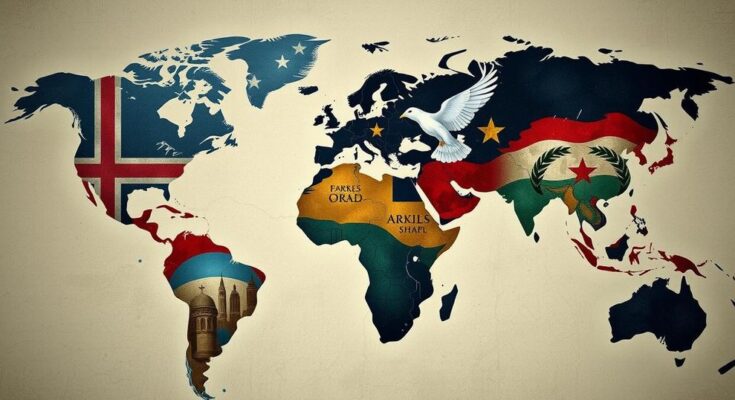This article addresses the humanitarian crises in the Occupied Palestinian Territory, Syria, Yemen, and Sudan. Key issues include the recent ceasefire between Israel and Hamas, ongoing aid mobilization in Gaza, malnutrition rates in Syria, hostilities in Yemen impacting aid delivery, and civilian attacks in Sudan. The UN and humanitarian agencies call for sustained support and protection for vulnerable populations amid these conflicts.
The Under-Secretary-General for Humanitarian Affairs, Tom Fletcher, expressed optimism about the recent ceasefire agreement between Israel and Hamas, which he sees as a critical opportunity for the millions affected by ongoing conflicts. He emphasized the need for both sides to respect the agreement and international humanitarian law, highlighting the urgency to protect civilians and facilitate humanitarian aid to those in distress. Furthermore, Fletcher called on the Security Council and Member States to ensure adequate funding and support for humanitarian operations in Gaza.
Humanitarian agencies are mobilizing to deliver aid across Gaza, where many have suffered for over 15 months due to trauma and loss. Ongoing air strikes continue to inflict damage, as was evident when an Israeli air strike in Deir al-Balah led to a fire burning down temporary shelters for displaced families. Agencies reported severe fuel shortages impacting hospitals and critical services, risking the lives of thousands of patients. Despite attempts to provide assistance, access remains blocked in many areas, highlighting the dire humanitarian situation.
In Syria, the UN is actively providing humanitarian aid, including food shipments from Türkiye to support those in need. Recent reports indicate alarming levels of malnutrition, with screening efforts underway to assist vulnerable populations. However, many children are unable to attend school as educational facilities remain overcrowded with displaced persons. Economic issues hinder access to food despite its availability in markets, complicating the humanitarian response.
In Yemen, Assistant Secretary-General Joyce Msuya warned of ongoing hostilities that threaten civilian infrastructure essential for humanitarian aid delivery. She advocated for the protection of Red Sea ports and highlighted the need for sustained humanitarian funding to alleviate the crisis. Msuya called for political resolutions and the safe release of detained humanitarian personnel, emphasizing the pressing need for peace.
Lastly, in Sudan, UN Coordinator Clementine Nkweta-Salami conveyed grave concerns about civilian attacks amid escalating violence in areas like Khartoum and Darfur. Reports of shelling and retaliatory strikes against civilians prompted Nkweta-Salami to firmly denounce such acts and call for adherence to international humanitarian law to protect civilians amidst the turmoil.
The article highlights pressing humanitarian crises across various regions, including the Occupied Palestinian Territory, Syria, Yemen, and Sudan. Each section details the ongoing challenges faced by civilians due to conflict, including the need for humanitarian aid, the impact on health services, and the dire conditions affecting basic rights and livelihoods. The role of the UN and other humanitarian agencies is significant in providing aid and advocating for international adherence to humanitarian laws, including the protection of civilians and infrastructure in conflict zones.
In summary, the article underscores the critical humanitarian challenges in the Occupied Palestinian Territory, Syria, Yemen, and Sudan. Despite ceasefire agreements and international efforts, civilians continue to face violence, infrastructure damage, and severe aid shortages. There is a pressing need for coordinated humanitarian support, adherence to international humanitarian law, and accountability to alleviate the suffering of affected populations and to restore hope for a more stable future in these regions.
Original Source: www.unocha.org




